Bachelor of Electrical Engineering with Honours
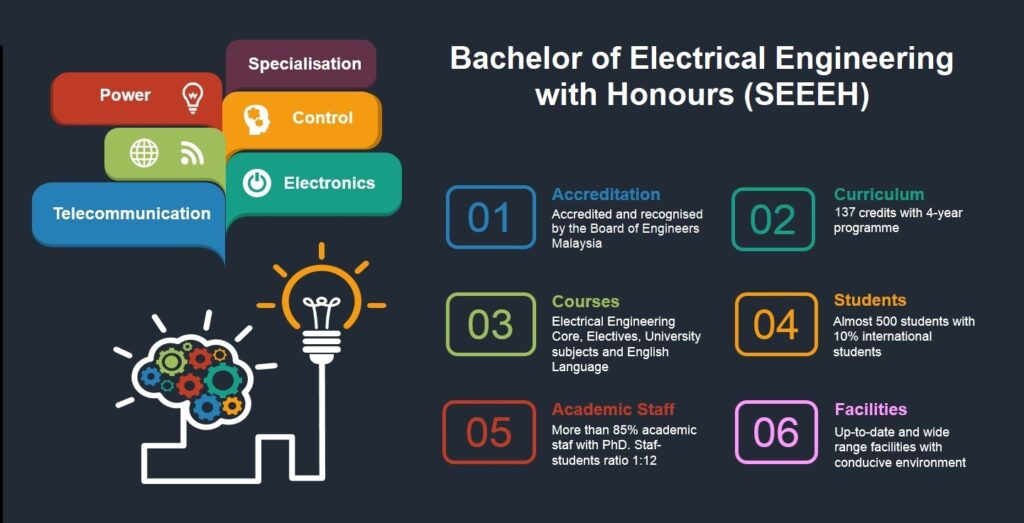
The Bachelor of Electrical Engineering with Honours programme (codenamed SEEEH), formerly called the Bachelor of Engineering (Electrical) programme (codenamed SEEE or SKEE), is one of the undergraduate programmes offered by the School of Electrical Engineering to prepare graduates for positions as electrical engineers. The SEEEH/SEEE/SKEE programme has been designed to emphasise not only on the understanding and acquisition of basic principles and skills in the field of electrical engineering, but also on a wide range of subareas including electronics, control systems, instrumentation, signal processing, telecommunications and power systems.
The curriculum of SEEEH/SEEE/SKEE consists of core and specialised electrical engineering courses, related general education and supporting non-technical courses. Furthermore, the students’ exposure to engineering practices is integrated throughout the curriculum through the combinations of industrial training and invited lectures from industries.
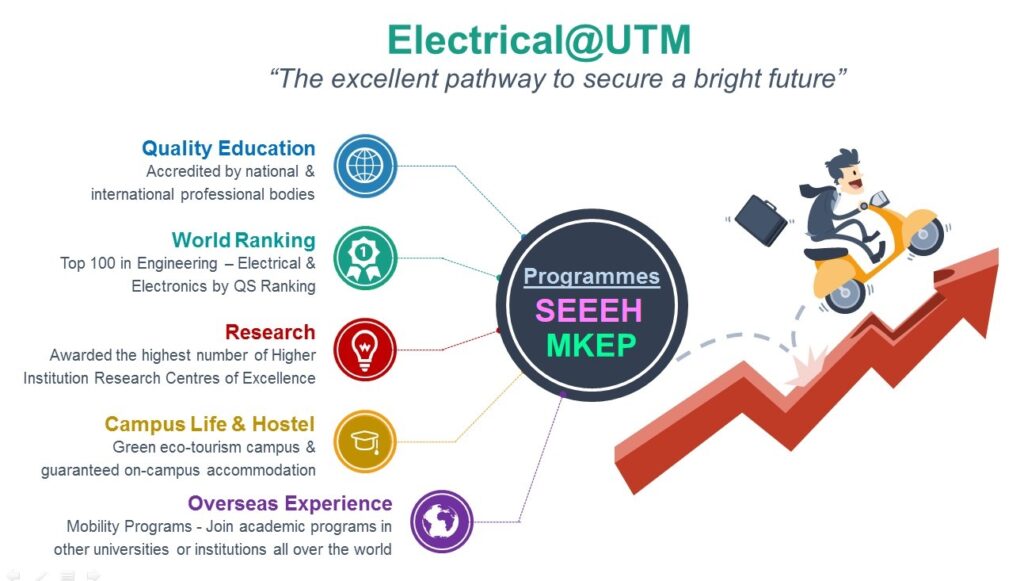
The SEEEH/SEEE/SKEE programme also provides the students with the opportunities for developing analytical, critical and constructive thinking skills in addition to communication, team-working and life-long learning skills in order to prepare the students for careers as electrical engineers in industries, public sectors, or continuing education at postgraduate levels.

The SEEEH/SEEE/SKEE programme offered by the School of Electrical Engineering is accredited and recognised by the Board of Engineers Malaysia (BEM). Graduates from the SEEEH/SEEE/SKEE programme may apply to to register with BEM as Graduate Engineer in the field of Electrical.

The four main choices of specialisation in the SEEEH/SEEE/SKEE programme, namely, Power Engineering, Control and Instrumentation Engineering, Electronic Engineering, and Telecommunication Engineering, allows the students to choose their area of specialisation towards the end of their study.
The 2021/2022 undergraduate handbook of the School of Electrical Engineering, in which you can find detailed programme information, course content and other useful information, can be downloaded here.
Information on how to apply for the undergraduate programmes of the School of Electrical Engineering can be accessed here.
The Programme Educational Objectives (PEOs) are statements that describe the expected graduates’ achievements after a few years of graduation. Table 1 shows the educational objectives for the programmes offered by School of Electrical Engineering and its targets of achievement.
Table 1: Programme educational objectives and the targets
| PEO Graduates of the programme are able to: |
Target (measured at least five years after graduation) |
|
| PEO1 | Become electrical engineers who are competent, innovative, and productive in addressing customer needs. | 60% of graduates work as engineers AND 10% of graduates work as senior engineer |
| PEO2 | Grow professionally with proficient soft skills. | 5% of graduates pursued post-graduate studies or enrolled in self-improvement or skill-based workshops (or equivalent) AND 1% of graduates become Professional Engineers or attain equivalent professional qualification |
| PEO3 | Demonstrate high standard of ethical conduct, positive attitude, and societal responsibilities. | 10% of graduates are involved in services to community |
The School of Electrical Engineering has set a five (5) year period after graduation for the assessment of PEO achievement. Alumni Survey and Employer Survey are two indirect assessments that have been used to measure the achievement of PEOs. The Employer Survey is meant to obtain feedbacks from the industries on performance of our alumni with respect to the PEOs whereas Alumni Survey is meant to get info about the alumni’s professional development.
Students of the Bachelor of Electrical Engineering with Honours programme are expected to have the following outcomes:
1. Ability to apply knowledge of mathematics, science, and electrical engineering to the solution of complex engineering problems.
2. Ability to conduct experiments and researches, perform analysis and interpret data for complex engineering problems.
3. Ability to identify, formulate, investigate and synthesis of information to solve complex engineering problems.
4. Ability to use appropriate techniques, skills, and modern engineering tools, instrumentation, software and hardware necessary for complex engineering practice with an understanding of their limitations.
5. Ability to design solutions for complex system, component, or process within a defined specification that meet specified needs with appropriate consideration for public health and safety, cultural, societal, and environmental considerations.
6. Ability to articulate ideas, communicate effectively, in writing and verbally, on complex engineering activities with the engineering community and with society at large.
7. Ability to function effectively as an individual, and as a member or leader in diverse teams.
8. Ability to recognise the need for, and have the preparation and ability to engage in independent and lifelong learning in the broadest context of technological change.
9. Ability to analyse the impact of global and contemporary issues, the role of engineers in society, including, health, safety, legal and cultural issues and the consequent responsibilities relevant to professional engineering.
10. Ability to understand the impact of professional engineering solutions to societal and environmental contexts and demonstrate knowledge of and need for sustainable development.
11. Ability to execute responsibility professionally and ethically.
12. Ability to demonstrate knowledge and understanding of engineering and management principles to manage projects in multidisciplinary environments.
The 2021/2022 curriculum for the Bachelor of Electrical Engineering with Honours programme is as follows. The subjects for the Field Electives depend on the student’s choice of specialisation from either Power Engineering, Control and Instrumentation Engineering, Electronic Engineering, or Communication Engineering. More details can be found in the 2021/2022 undergraduate handbook of the School of Electrical Engineering here.
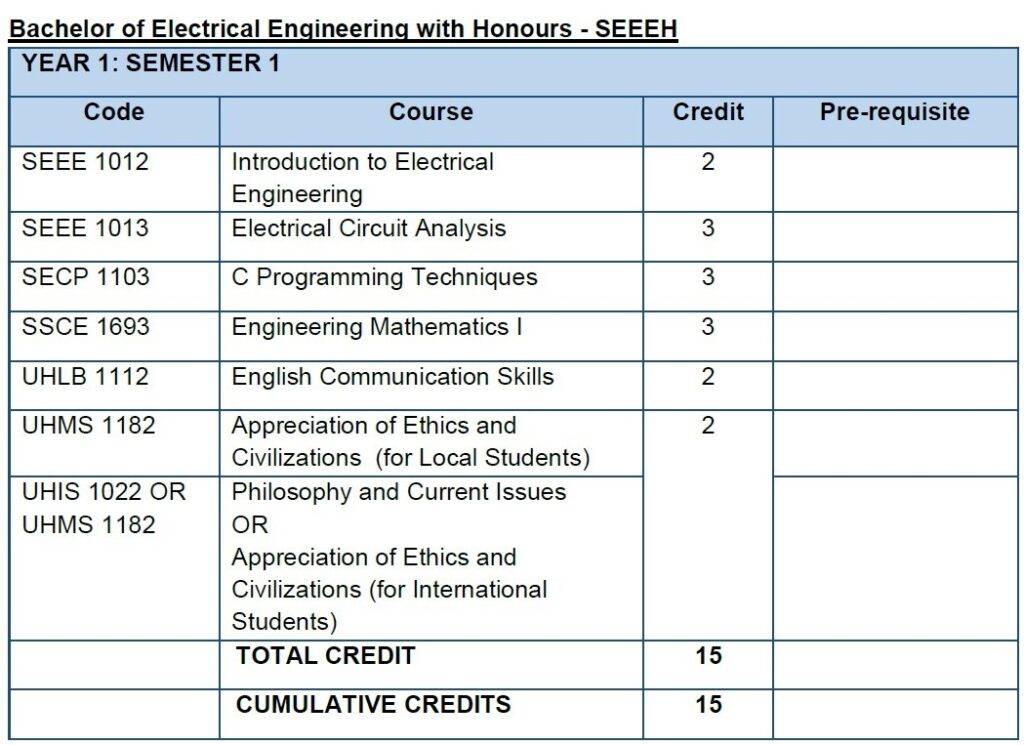
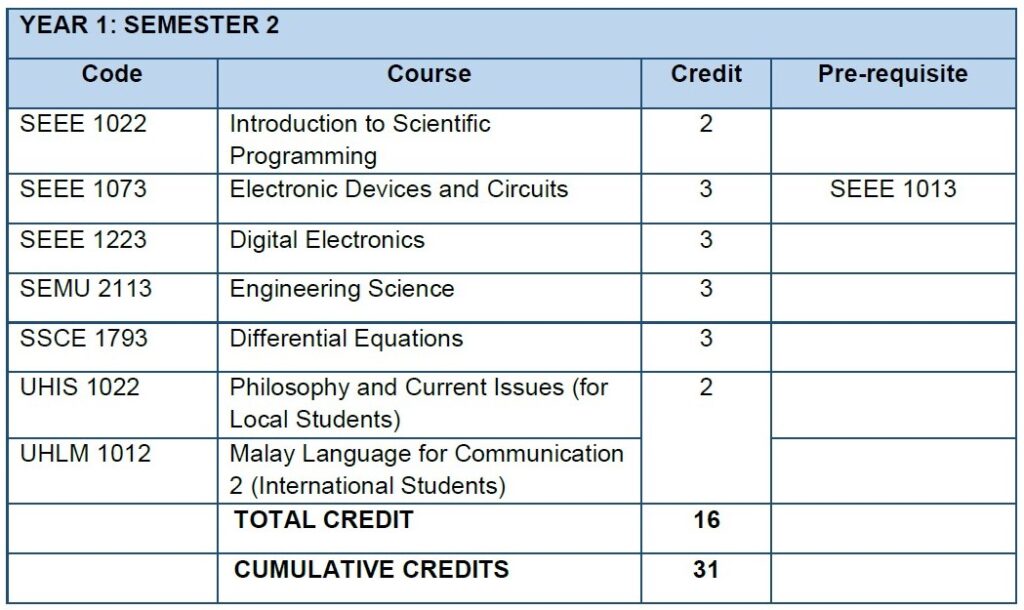
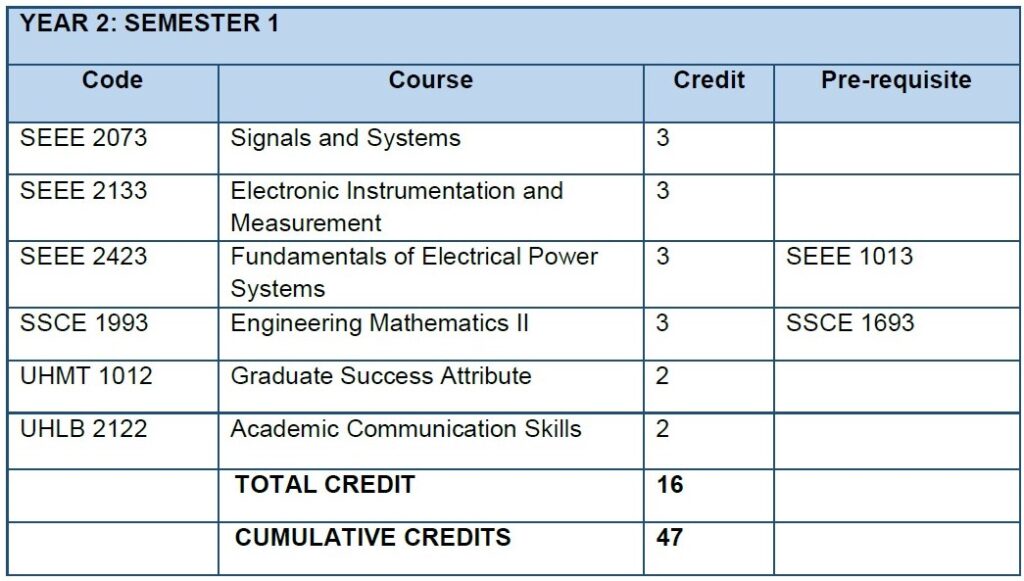
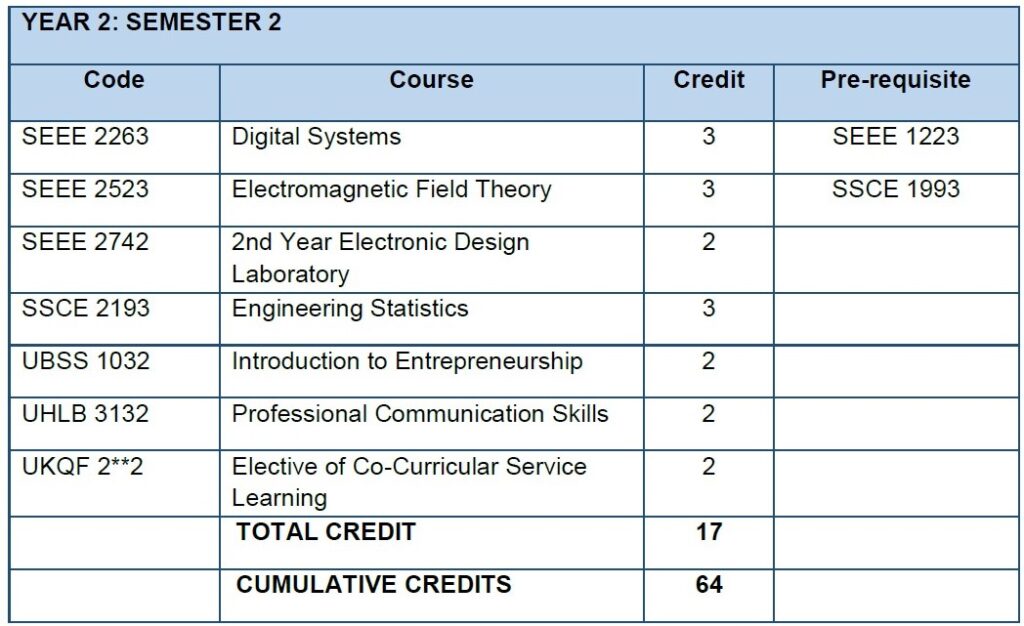
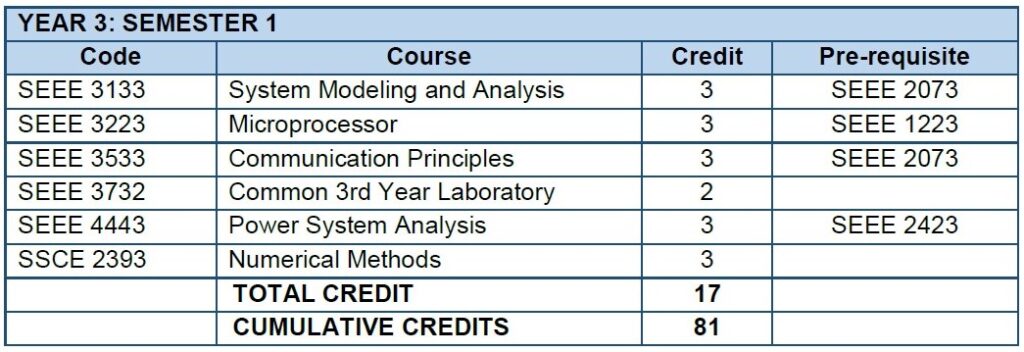
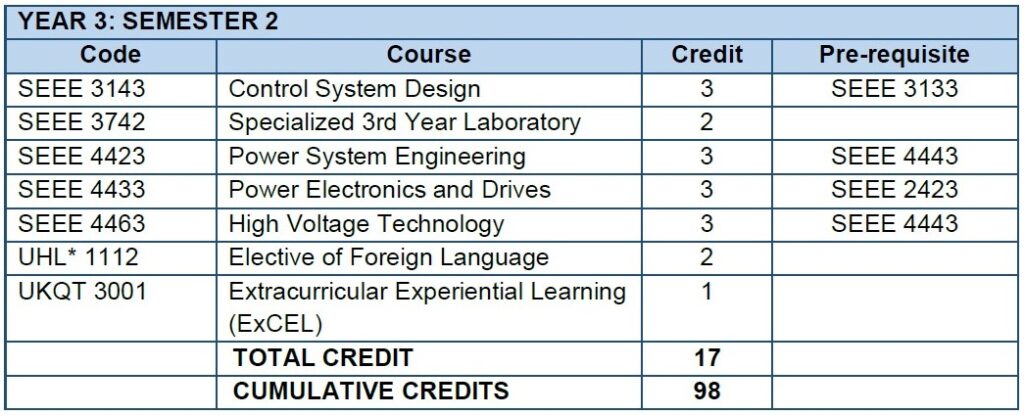

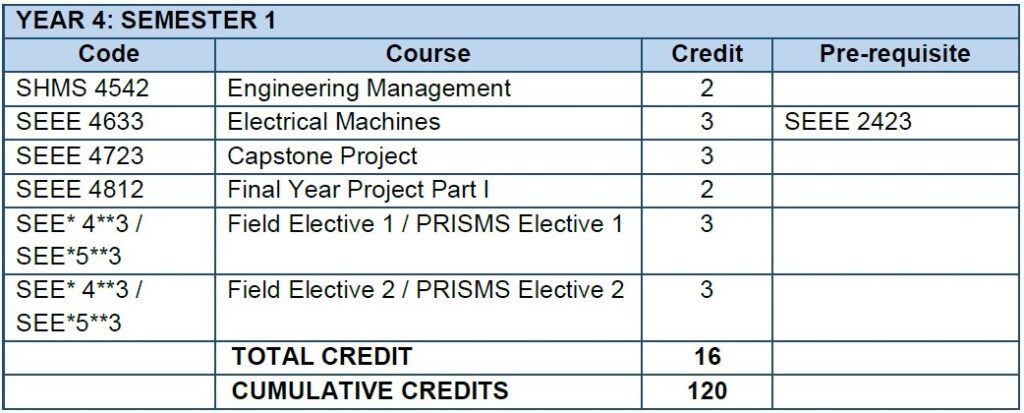
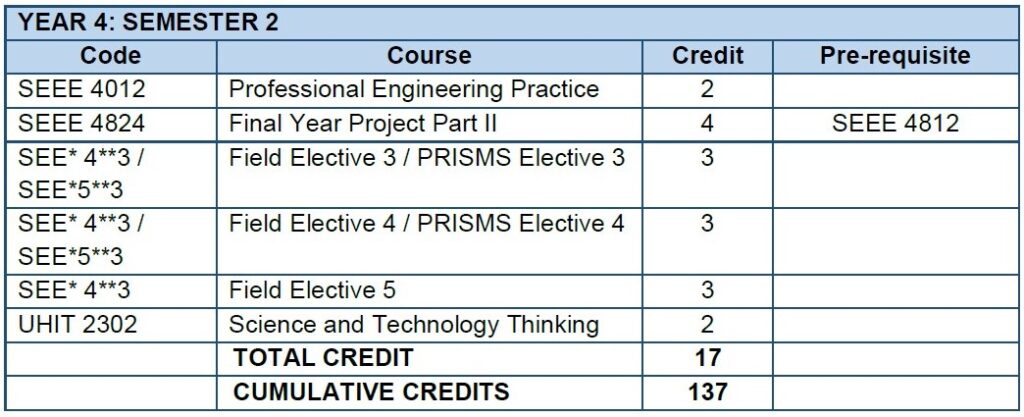
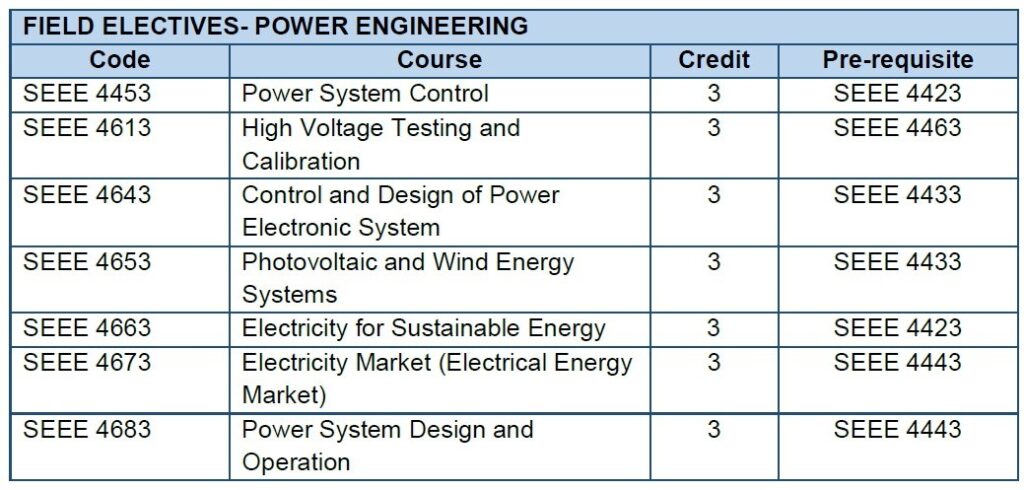
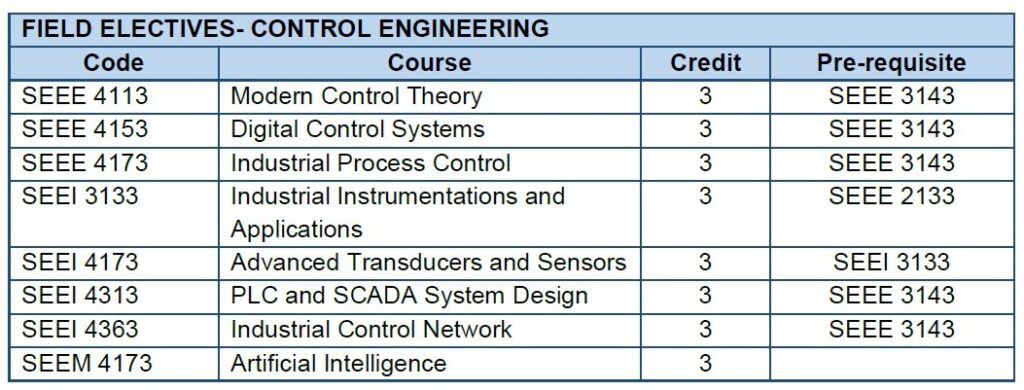
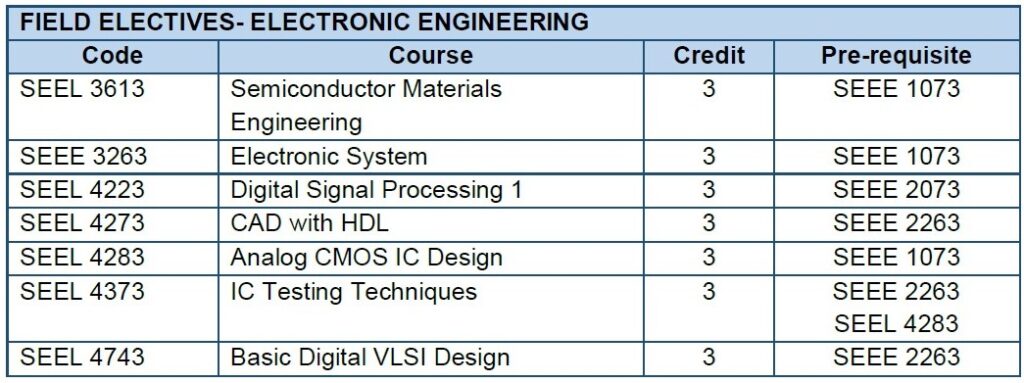
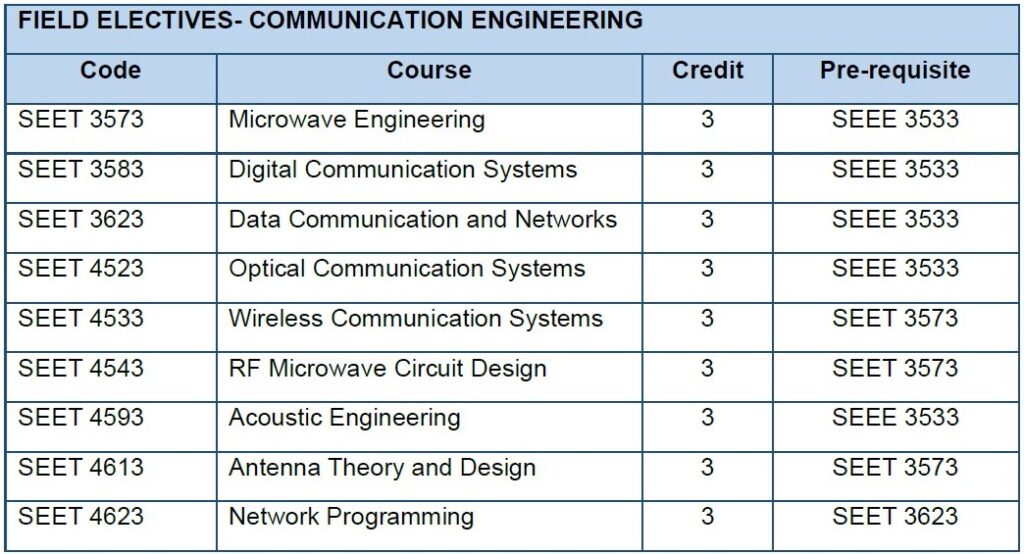
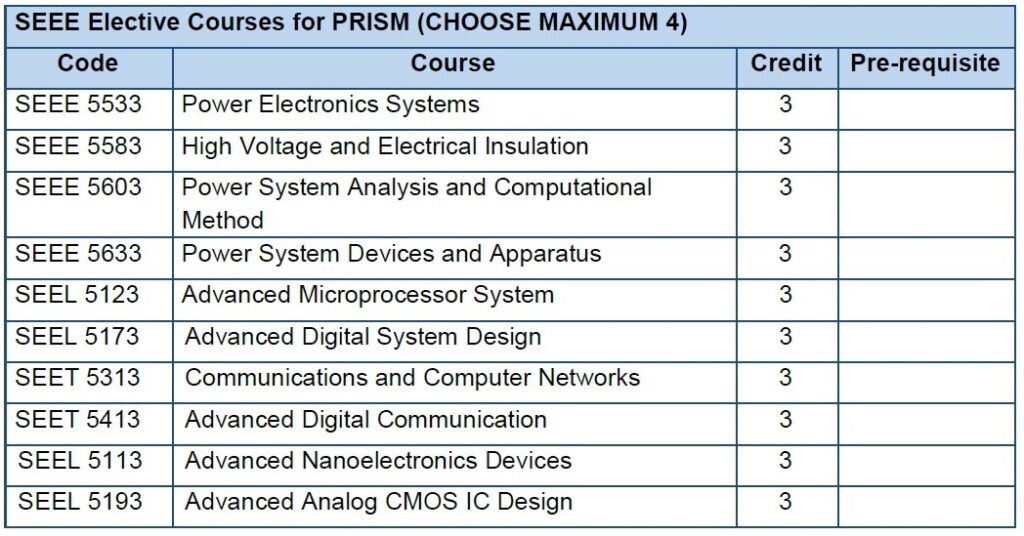
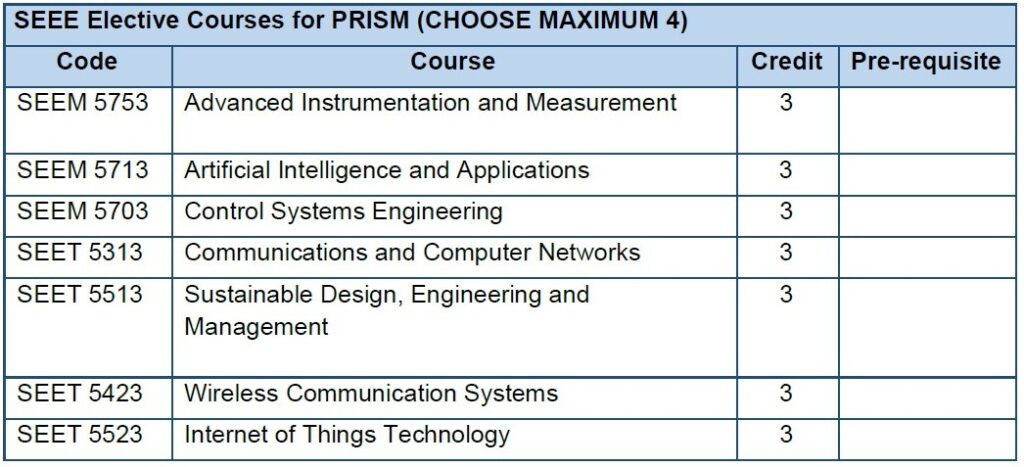
The University adopts the semester system. The academic year is divided into two (2) normal semesters, namely Semester I and Semester II, and a short semester at the end of Semester II. Thus, intake of new undergraduate students is normally made during the semester I of an academic year. The minimum duration of the programme is 4 years (8 semesters). The programme is conducted based on lectures, tutorials and practical sessions.
Students are obliged to take compulsory, University General Courses which are Ethnic Relation, Islamic and Asian Civilization, Management, English Language and Co-curriculum.
Final year students are required to carry out a research or design project in the related field. At the end of each semester of their final year, a report based on the research must be submitted.
Students are also required to undergo Industrial Training for 12 weeks either at the private or government sector during the short semester of the third year. This is to equip the future graduates with practical technical knowledge while exposing them to the working environment in the industry.
All the courses offered by the Faculty have credits except for courses, which are approved by the University Senate. One (1) credit is equivalent to 14 hours of lectures or 30 hours of practical sessions (studio/project), in a semester.
All students’ performance and achievements are assessed formally. Normally, every course is assessed based on the coursework, which constitutes not less than 50% of the overall marks, and a final exam paper, which constitutes another 50% of the overall marks. Coursework may be in the form of homework, quiz, test and presentation. Final examination is held at the end of each academic semester. Students’ performance in a course is indicated by the grade obtained. Generally, the passing grade for any course is a ‘D+’. Students who fail a course (obtained a grade ‘D’ and below) are required to repeat the course the following semesters when it is offered. Students may improve the grade of any course with a ‘B-’ or lower once. Subject to the Faculty and University’s Academic Regulation, students may withdraw from a course.
A student must pass all courses specified in his/her programme of study and fulfill all the requirements specified for his/her
programme of study set by the Faculty and University in order to be awarded with the Bachelor degree.
The requirement for a professional workforce in the Electrical Engineering field increases each year. This requirement is increasing rapidly with the growth of foreign investment in Malaysia, particularly in electronics and semiconductor industries as well as manufacturing and processing industries.
Generally, graduates with the Bachelor of Electrical Engineering with Honours degree may find many exciting opportunities in electrical
related industries. These include:
• Communication equipment and network providers (Telekom Malaysia, CELCOM, MAXIS, Media Prima, etc.)
• Computers and peripheral device manufacturers (Intel, Agilent, IBM, etc.)
• Consulting engineer firms
• Education and training institutions (Universities, Polytechnics and Colleges)
• Electric energy production companies (Tenaga Nasional Berhad and IPPs)
• Manufacturing of component and equipment companies (Panasonic, Flextronics, ON Semiconductor, etc.)
• Power equipment manufacturers
• Research and design organisations (SIRIM, MIMOS, Universities, TNB, etc.)
• Semiconductor chip designers and manufacturers (Texas Instruments, Intel, Motorola, etc.)
• Automotive manufacturer and assembly firms
• Biomedical engineering firms
• Consultation firms
• Electronic equipment’s production industries
• Engineering and product development firms
• Food processing factories
• High-technology based firm such as aerospace
• Home appliances (such as washing machines, TV, radio, rice cooker, etc.) manufacturing firms
• Oil and gas companies
• Research and design organisations (SIRIM, Universities, etc.)
• System automation manufacturer firms
